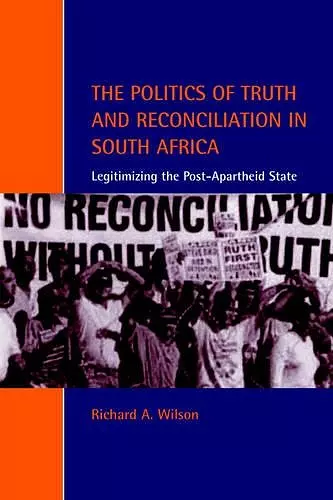The Politics of Truth and Reconciliation in South Africa
Legitimizing the Post-Apartheid State
Format:Paperback
Publisher:Cambridge University Press
Published:2nd May '01
Currently unavailable, and unfortunately no date known when it will be back
This paperback is available in another edition too:
- Hardback£100.00(9780521802192)

This book shows the impact of the TRC in urban African communities in Johannesburg.
The TRC was set up to deal with the human rights violations of apartheid. However, its restorative justice approach did not always serve the needs of communities at a local level. Based on detailed fieldwork, this book illustrates the impact of the TRC in urban African communities in Johannesburg.The South African Truth and Reconciliation Commission (TRC) was set up to deal with the human rights violations of apartheid during the years 1960–1994. However, as Wilson shows, the TRC's restorative justice approach to healing the nation did not always serve the needs of communities at a local level. Based on extended anthropological fieldwork, this book illustrates the impact of the TRC in urban African communities in Johannesburg. While a religious constituency largely embraced the commission's religious-redemptive language of reconciliation, Wilson argues that the TRC had little effect on popular ideas of justice as retribution. This provocative study deepens our understanding of post-apartheid South Africa and the use of human rights discourse. It ends on a call for more cautious and realistic expectations about what human rights institutions can achieve in democratizing countries.
'Wilson's careful analysis of the commission's work is instructive for all those who seek to assist nations and peoples in the transition from dictatorship to democracy.' Law Society Journal
'This book is a thoughtful and in depth study of post-apartheid South Africa which pulls no punches in its description of that society and the workings of the TRC.' Dr Srechko Konteli, Law Institute Journal
'… compelling … Wilson offers anthropological fieldwork carried out among black township populations. This research provides an illuminating account of how the TRC's work failed to take into account the wishes and worldviews of this important and large sector of the population …'. Karima Bennoune, European Journal of International Law
'Just about the best thing written on the TRC so far, it is deeply analytical yet broad in scope. Wilson offers us engaging chapters of the TRC's political life, the way in which it gathered information, and popular understandings of vengeance and retribution in urban African communities around Johannesburg … This is a remarkable book. it should be read by anyone wishing to cut through much of the flotsam which has come to characterize talk of forgiveness and reconciliation in post-apartheid South Africa. It will be of use to historians as a trenchant contemporary evaluation of the TRC's work.' Journal of African History
'This book is an important and careful analysis of the workings of the South African Truth and Reconciliation Commission (TRC) … stringently and persuasively argued …'. The Round Table
'Throughout this carefully considered book, he combines cool scholarly analysis with passionately held humane opinions. It is a fine piece of work.' The Journal of the Royal Anthropological Institute
'Wilson's study makes a strong and convincing argument.' Journal of Southern African Studies
ISBN: 9780521001946
Dimensions: 230mm x 148mm x 19mm
Weight: 500g
296 pages